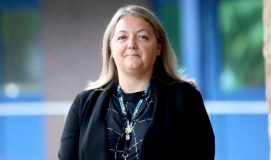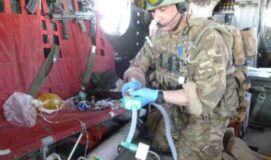Nottinghamshire Police’s family liaison officers are in many ways the very last people you’d want to meet, but in times of crisis they play an absolutely invaluable role – both in supporting bereaved families and investigating incidents where people have died.
Detective Inspector Melanie Crutchley, one of Nottinghamshire Police’s most experienced FLOs, has spoken about about this hidden, often misunderstood role, and explained what motivates people like her to voluntarily support grieving members of the public through the most upsetting, bewildering and tragic times in their lives.
“Thankfully, the only experience most people will ever have of a family liaison officer is through the television dramas that almost always misrepresent what we actually do,” says Detective Inspector Melanie Crutchley, a family liaison coordinator who helps to manage a specialist team of around 40 volunteer officers.
“I think most people who’ve heard of the role know that we work to support the families of people who have died, but in the real world our work goes way beyond the tea and sympathy portrayal so often seen on the TV. In reality our role is every bit as much about solving crime as much as it is comforting people.
“Yes we are there to help people through often unimaginably awful times in their lives, but if we suspect a crime has been committed we are also there to help find answers and get justice. That can mean having very difficult conversations with families and asking some very difficult questions, but first and foremost we are police detectives and our job is to solve crimes. On some very rare occasions that means we end up investigating the people we are supporting.”
Family Liaison Officers are trained detectives who volunteer for the role in addition to their other daily duties. They are assigned to families when somebody has died – either as the result of a road traffic accident or a crime – and will retain contact with that family until the all criminal, coronial and other legal proceedings have finished.
Fundamentally they are in place to act as a bridge between bereaved families and the team investigating the incident that led to their loved one’s death.
They are tasked with maintaining an effective two way flow of information and also with managing the numerous external stress factors that can cause additional distress at times of crisis – from dealing with media requests to liaising with undertakers.
Examples of incidents where FLOs are assigned include fatal accidents, suspected murders and even terrorist attacks at home and abroad. Individual officers – who will mostly have multiple over-lapping cases to deal with – are assigned to families based on their professional experience and likely bond with the people they will be tasked to support.
“It’s certainly not a role that is suitable for everyone,” adds DI Crutchley. “Grief is a very powerful emotion and it can often take over in times of crisis – leading people to behave in ways that they would not normally behave in. People can be angry; they can be hostile, and they can just be completely overwhelmed by what is happening to them. In some circumstances people can even be actively hostile to the police.
“I think it takes a very special person to volunteer to put themselves into those situations time and again in the full knowledge that they will be walking into a situation where they will have to have with bereaved people the most difficult conversations of their lives – about things like organ donation, identifying and even repatriating the body or even body parts of a loved one.”
As well as dealing with fatal accident and incidents at home, Nottinghamshire Police’s FLOs have also assisted several people who’ve lost loved ones abroad to acts of terror and natural disasters abroad – working in partnership with the Foreign and Commonwealth office and local law enforcement agencies to bring people home and to fully investigate what happened.In recent years the force has supported the families of people killed in terror attacks in Kenya and Tunisia.
Asked about what has motivates here to continue with such a demanding role DI Crutchley added:
“For me the role is about giving those people the very best possible service from Nottinghamshire Police at what will almost inevitably be the most difficult period of their lives. And if you get that right you can make a massive difference to families. Being honest and responsive to people means you can really do something to help people – and at the end of the day, for me, that is what being a police officer is all about.”



 Posted on 10th Dec
Posted on 10th Dec


